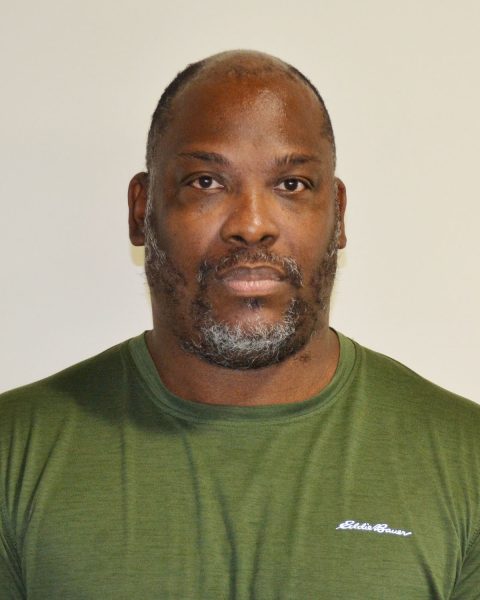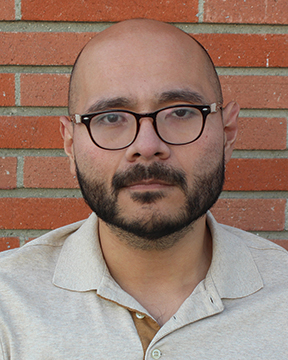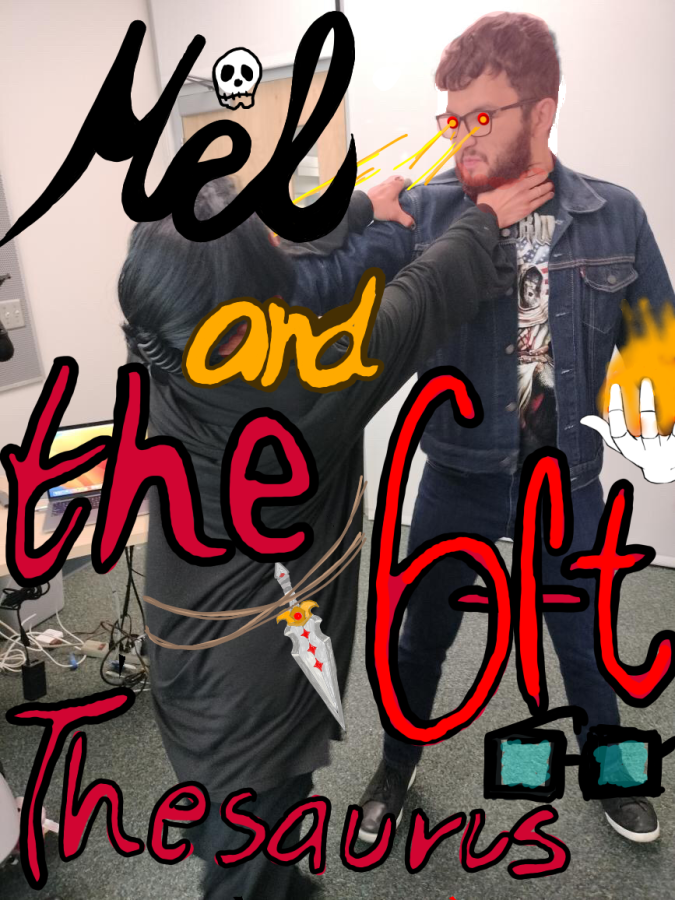Derrick Coleman 0:01
Hello and welcome back to overcoming. I’m Derrick.
Luis Lemus 0:04
I’m Luis
Denise Ng 0:05
I’m Denise.
Derrick Coleman 0:06
So Denise, can you tell us just a little bit about yourself and then we’ll go into our topic today.
Denise Ng 0:12
I am journalism major here at Cerritos College. And I have severe asthma and food allergies. I’m allergic to products that have ingredients that I’m allergic to. So like if it contains oranges or a certain flower and you’re wearing a perfume or lotion, I can have an anaphylactic reaction in which I actually had for my four semester back.
Derrick Coleman 0:45
Oh wow, that’s crazy.
Derrick Coleman 0:49
So let’s go into today’s topic. What about two weeks ago, we had a bomb threat right here at school, right and we want to kind of explain to you guys what is that like from our disabled community base. Who wants to go first?
Luis Lemus 1:07
I’ll go first. I feel like as a disabled student in scooter, I feel like I’m sitting duck at if they were in active shooter situation. I could drop down but there’s not much more I could do. I feel like in that situation, I would be waiting for the worst or plopping down and not being able to take cover.
Derrick Coleman 2:07
So Denise, you want to give us a little bit of what you think about the bomb that we had?
Denise Ng 2:13
I think that we should have a plan in place for people with disabilities. You know, our disabilities are different, but they’re disabilities and we do need assistance, right? So for example, with Luis who has this chair that he is in, there should be a plan on where he’s supposed to go and who is supposed to help them and who is assigned to help him. For me, if I were to have an asthma attack, during that, you know, the situation then, I mean, I could possibly just pass out and die from not being able to breathe.
Derrick Coleman 2:48
I know like the school had a forum about it last week, and one of the students said he was deaf. He’s deaf and he said he really didn’t know was what was going on because his translator was in there with him. That’s a big long and so I and I think, especially a school like this if our campus is not the same as with our with DSPS support room, there’s gonna be some major, major, you know.
Luis Lemus 3:29
Yeah, if they’re not in thing sync nothing but problems are bound to happen.
Denise Ng 3:39
In my bio class, my professor, you know on our first day he went through the plan. He said if there is an active shooter, if there is an emergency, this is what we’re going to do. This is where we’re going to go if this happens or we’re in this scenario or that scenario. This, this, this is going to happen and it changed. And he, he, he went through it. He spent a good 30 minutes going through everything telling us where we’re supposed to be and how long we were supposed to stay.
Derrick Coleman 4:13
I used to go to a different campus and would be at the Disabled Student Program. Beginning of every semester, they would go to that. If earthquake happens this which is supposed to do, if there’s a shooting on campus, this is what you’re supposed to do. If there’s a fire, this is what you’re supposed to do.
Denise Ng 4:35
Right.
Derrick Coleman 4:36
It’s it’s pretty simple.
Luis Lemus 4:38
Yeah, So you would think it simple
Denise Ng 4:42
But along with that, what they should do is, tell us what the plan is for people with disabilities. So that should be included.
Luis Lemus 4:53
But I think every building is has different capabilities, different hardships, different ways that we can protect one another and be safe. I mean, what my more care might not in the social science building and what works their mind not in the liberal art building and so on.
Denise Ng 5:35
So I take extra precaution and what I’ve done in the past is I will let the person sitting next to me know, hey, if I have an anaphylaxis reaction or if I’m having an asthma attack, inside this bag right here is my epi pen. Here is my inhaler. Here is Benadryl. Just so you know. Help me if I need it.
Derrick Coleman 6:04
Right. Louis, you wrote the co-wrote an article for our opinion piece based on this. Can you tell us a little bit about what you wrote in it?
Luis Lemus 6:15
Yeah. What I found has been on campus during the whole debacle was system in place. What’s it called? The rave alert. It went off way too late after what they knew and all we got were continual every few minute. Stay in place. Stay in place. What do you do in that situation? Are you just waiting for your demise? Or who’s coming? You don’t know.
Derrick Coleman 7:23
I think one of the things that should do is, and I’m thinking from the disabled student, the disabled person way, I think they should have monitors to where if something like that happens, a monitor should be able to come on immediately and start translating. You know, like telling them what to do. You guys understand what I’m…
Luis Lemus 7:51
Yeah,
Derrick Coleman 7:53
I think they did. There’s changes that that needs to be made.
Luis Lemus 7;58
Oh yeah.
Denise Ng 8:00
Yes, but we should have, there should be a plan in place before anything happens so that we’re familiar with what we should do.
Luis Lemus 8:09
Oh yeah
Luis Lemus 8:13
I mean, again, as a disabled person without the ability to walk on my own, I fear now. I’ve never had the fear of being here until now. That now I have that thought in the back of my head. What am I gonna do? And hopefully with upcoming, I think the eighth of October a few DSPS students and faculty are going to meet and talk about their concerns. And I know that I’m not the only one I mean if it’s everyone for themselves, then what am I going to do? I can’t go down the stairs. If I’m in the SS building, I can’t. If they lock the elevator, I can’t go down. Except for that slide they have on the side of the stairwell.
Denise Ng 10:18
But how are you supposed to get from your chair to this slide? So I think that’s another concern. I think this is good that we’re bringing this up because then we can go to the administration and say, hey, part of the emergency team should be a person who can help people with disabilities, and they should go to every building.
Luis Lemus 10:44
Yes, they should. I mean, that is a great idea to bring up to their attention. I mean, if they’re looking For voices for opinions for open discussion, then that will I’ll bring that up on the 8th. Definitely
Derrick Coleman 11:21
Can you keep us updated with that though?
Luis Lemus 11:22
Oh yeah most definitely.
Denise Ng 11:24
But do you even want to wait till October 8?
Luis Lemus 11:28
I personally don’t. I mean, I feel safe here. But you never know. And that’s the biggest concern that you don’t know what one person might have been their backpack and what might make them snap.
Derrick Coleman 12:01
True.
Denise Ng 12:02
And that person who called in bomb threat he didn’t, he was not even a student here.
Derrick Coleman 12:08
No. Any closing thoughts before we
Denise Ng 12:17
No, I’m just, you know, thank you for inviting me to speak. I hope that we…
Derrick Coleman 12:23
you are coming back, right?
Denise Ng 12:24
Yes, I’m coming. I hope that we can make some positive changes here with this podcast and move forward to keep everybody safe and to help our fellow students with disabilities.
Luis Lemus 12:43
And me, I feel I will keep you guys updated on the meeting, how it went, what was discussed, and I am thankful that nothing happened, but I am ready to address what where they failed and what could be done in my own opinion.
Derrick Coleman 13:18
That works. This is overcoming. I’m Derek
Luis Lemus 12:23
I’m Luis
Denise 13:24
I’m Denise.
Derrick Coleman 13:24
I will see you guys next week.
Transcribed by Denise Ng and Quinae Austin











